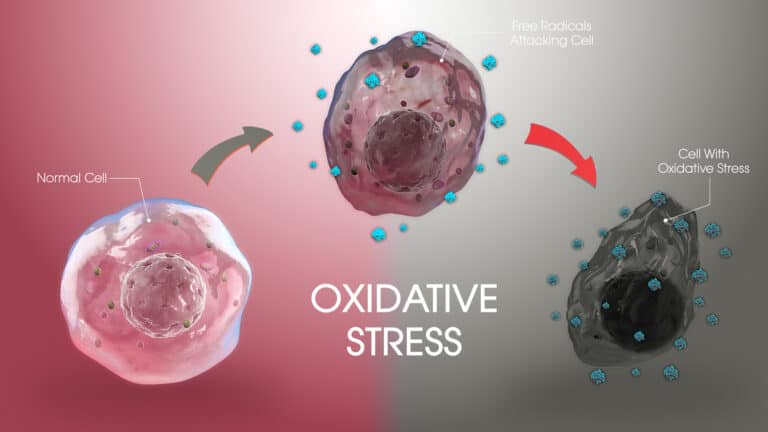Predicting the onset of disease
Elevated oxidative stress (OS) is well known to be a direct cause of disease!

What is oxidative stress?
When oxygen carrying molecules have an uneven number of electrons, they are called free radicals. This uneven number causes them to react with other molecules, which then create large chain chemical reactions. Antioxidants are molecules that can donate electrons to a free radical without making themselves unstable, and at the same time, cause the free radical to stabilize and become less reactive. The body’s cells produce free radicals during the metabolic processes. On the other hand, cells also produce antioxidants that neutralize the effects of these free radicals, and the body is generally able to manage a balance between both. However, an imbalance between oxidants and antioxidants is the basis for oxidative stress.
What are some causes of oxidative stress?
The various factors that contribute to a person’s oxidative stress include:
- Alcohol consumption
- Diets high in fats and sugar
- Exposure to pesticides and industrial chemicals
- Exposure to radiation
- Obesity
- Pharmaceuicals
- Pollution
- Processed foods
- Smoking and use of other tobacco products
What are some of the effects of oxidative stress?
The effects of oxidative stress are not always harmful. Oxidative stress from exercise is beneficial as the free radicals formed during physical activity regulate tissue growth and stimulate the production of antioxidants. Mild oxidative stress also protects the body from diseases and infections. Long term oxidative stress, on the other hand, causes damage to the body’s cells, DNA and proteins. This not only contributes to aging, it is also a cause for the development of a large number of diseases in the body over a period of time. Some of these conditions or diseases are:
- Aging
- Alzheimer’s disease
- Asthma
- Cancer
- Cardiovascular diseases like high blood pressure, stroke, atherosclerosis
- Chronic fatigue syndrome
- Chronic inflammation
- Diabetes
- Neurodegenerative diseases
- Parkinson’s disease
How can I test my risk of disease from oxidative stress?
The oxidative stress index (OSI) has been shown to be an indicator of the likelihood of noncommunicable disease onset. The OSI can also be used in multiple other applications, including:
- predicting disease causing parameters for Alzheimer’s disease and other diseases
- as a public health survey instrument
- predicting adverse drug reactions
- as a health prescreening tool
- and for health screening in areas with limited medical facilities and personnel.
In addition to being a valuable predictor of disease onset likelihood, it is also an indicator of lifestyle changes that can be made to lower OS and thereby help prevent disease. The OSI addresses genetics, age, weight, illnesses, conditions that are exacerbated by increased OS, medical symptoms, clinical laboratory results, prescription medications regularly taken, lifestyle and emotional stress.
A detailed version of the OSI questionnaire consists of more than 400 items; however, this condensed version can provide similar predictions with only 8 questions.
Once you submit your responses, your results will be displayed.
 Click here to learn more about our Testimonials and Results Disclaimer
Click here to learn more about our Testimonials and Results Disclaimer
Disclaimer: Information on this web site is provided for informational purposes only. The information is a result of years of practice experience by the authors. This information is not intended as a substitute for the advice provided by your physician or other healthcare professional or any information contained on or in any product label or packaging. Do not use the information on this web site for diagnosing or treating a health problem or disease, or prescribing medication or other treatment. Always speak with your physician or other healthcare professional before taking any medication or nutritional, herbal or homeopathic supplement, or using any treatment for a health problem. If you have or suspect that you have a medical problem, contact your health care provider promptly. Do not disregard professional medical advice or delay in seeking professional advice because of something you have read on this web site. Information provided on this web site and the use of any products or services purchased from our web site by you DOES NOT create a doctor-patient relationship between you and any of the physicians affiliated with our web site. Information and statements regarding dietary supplements have not been evaluated by the Food and Drug Administration and are not intended to diagnose, treat, cure, or prevent any disease.


You must be logged in to post a comment.